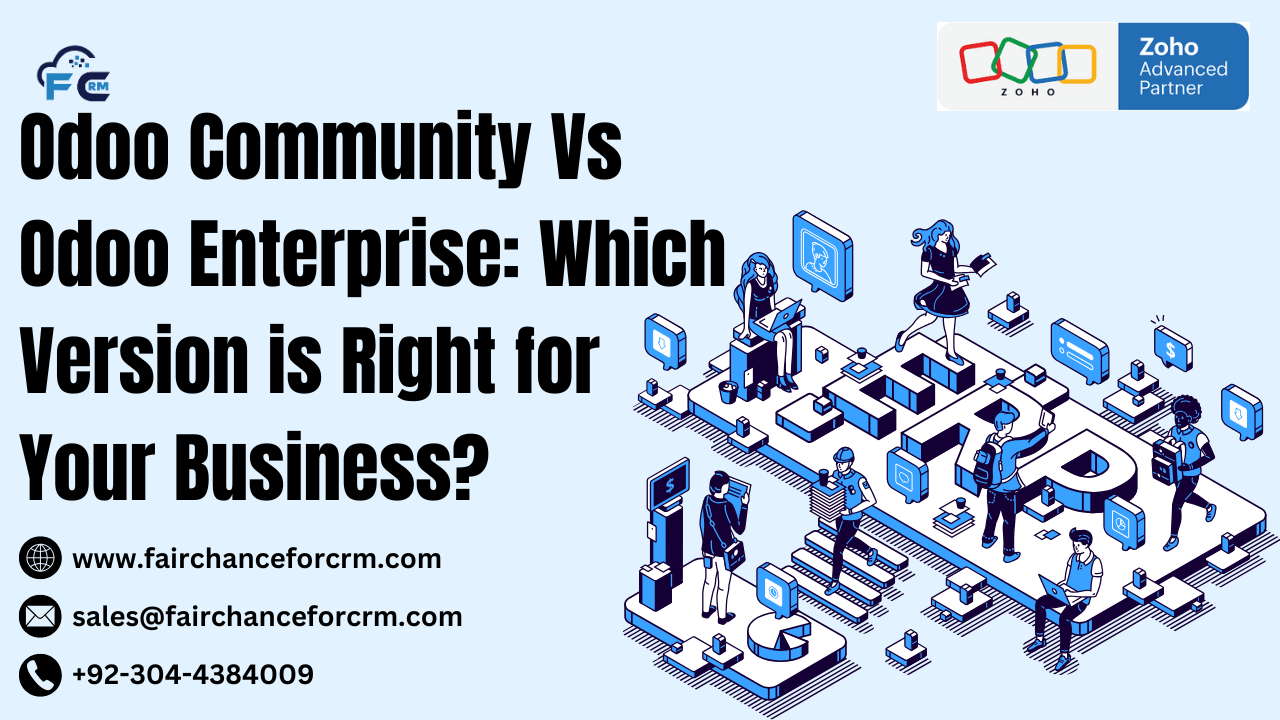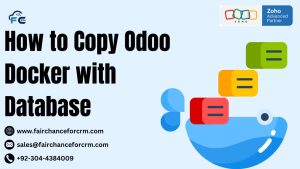Odoo is a highly versatile and popular business management software suite, offering both an open-source version (Odoo Community) and a paid, feature-rich version (Odoo Enterprise). Both versions serve the same fundamental purpose—helping businesses manage various operations—but there are significant differences in terms of features, support, and scalability.
In this article, we’ll break down the differences between Odoo Community Vs Odoo Enterprise, so you can make an informed decision about which version best suits your business needs.
Also Read:
- Odoo Asset Management: A Comprehensive Guide
- Odoo Debug Extension: A Comprehensive Guide to Debugging Odoo Applications
- Odoo Studio: A Comprehensive Guide to Customizing Your Odoo Experience
- Maximizing Workforce Efficiency with Zoho Workerly
- Zoho Valuation: Understanding the Success of Software Giant
1. Overview of Odoo Community Vs Odoo Enterprise
Odoo Community:
Odoo Community is the open-source version of the Odoo platform, which is free to download, install, and use. It provides core business functionality for small and medium-sized businesses (SMBs), including modules for sales, inventory, CRM, project management, and more. While it is highly flexible and customizable, Odoo Community lacks some of the advanced features and support provided by the Enterprise version.
Odoo Enterprise:
Odoo Enterprise is the paid version of Odoo, offering a complete suite of business applications with additional features, better usability, and professional support. The Enterprise version is ideal for medium to large businesses that require more advanced functionalities, seamless integration, and expert support. Odoo Enterprise includes all the features of Odoo Community, plus additional modules, mobile apps, enhanced performance, and exclusive tools for accounting, human resources, and eCommerce.
2. Key Differences Between Odoo Community Vs Odoo Enterprise
Here’s a detailed comparison of the major differences between Odoo Community and Odoo Enterprise:
| Feature | Odoo Community | Odoo Enterprise |
|---|---|---|
| Cost | Free (Open Source) | Paid (Subscription-Based) |
| License | Open Source (GPL v3) | Proprietary (Subscription-based License) |
| Support | Community support via forums and documentation | Dedicated support from Odoo, including updates, bug fixes, and security patches |
| Modules | Basic modules (Sales, CRM, Inventory, etc.) | All Odoo Community modules + advanced modules like Accounting, HR, Manufacturing, etc. |
| User Interface (UI) | Basic UI, customizable but less polished | Enhanced, user-friendly UI with modern design |
| Mobile Apps | Not Available | Mobile apps for iOS and Android |
| Cloud Hosting | No official hosting option (Self-hosted) | Official cloud hosting with automatic updates and maintenance |
| Performance | Basic performance optimization | Optimized for better performance, scalability, and high loads |
| Customizability | Highly customizable with code | More out-of-the-box options for customization and additional features |
| Accounting & Finance | Basic accounting features | Full accounting suite with tax management, invoicing, bank integration, etc. |
| Reports and Dashboards | Basic reporting features | Advanced reporting and business intelligence features |
| Integrations | Limited integrations | Seamless integration with third-party tools, including payment gateways, ERP, and more |
| Enterprise Features | Not available | Features like HR management, advanced inventory, manufacturing, and project management |
| Access Control | Basic user roles and permissions | Advanced user roles and permissions, including multi-company and multi-currency support |
| Backup and Data Security | Manual backups | Automated backups, enhanced security features, and disaster recovery options |
Detailed Comparison of Key Features
1. Cost:
- Odoo Community: Free to download, install, and use, making it an attractive choice for small businesses or startups with limited budgets. However, any customizations, hosting, and support will come at additional costs if needed.
- Odoo Enterprise: Odoo Enterprise is subscription-based, and the cost depends on factors such as the number of users and the specific modules you require. Businesses pay a monthly or annual fee, which includes support, hosting (if opted), and access to advanced features.
2. Modules and Features:
- Odoo Community: Offers essential modules like Sales, CRM, Inventory, and Project Management. However, it lacks some of the advanced functionality available in the Enterprise version, such as full accounting features, HR modules, manufacturing management, and eCommerce integration.
- Odoo Enterprise: Includes all modules found in Odoo Community and provides access to additional features such as Accounting, HR (Payroll, Recruitment, Leave Management), Manufacturing, Marketing Automation, and more. It also includes enhanced reporting and business intelligence tools that are crucial for larger businesses.
3. Support and Maintenance:
- Odoo Community: Relies on community support, which means businesses have to depend on forums, documentation, and user-driven contributions. It’s less suitable for businesses that need immediate or professional support.
- Odoo Enterprise: Includes direct support from Odoo’s team, which provides ongoing maintenance, security patches, updates, and bug fixes. This ensures your system is always up-to-date and working optimally. Odoo also offers priority assistance for critical issues.
4. Cloud Hosting:
- Odoo Community: Requires businesses to set up their own hosting infrastructure (self-hosted), which may involve additional work and costs. It does not include cloud hosting options from Odoo.
- Odoo Enterprise: Provides cloud hosting through Odoo.sh or Odoo’s managed hosting. Cloud hosting comes with automatic updates, backup, and enhanced performance, making it easier to manage the system.
5. User Interface and Experience:
- Odoo Community: The UI is functional but relatively basic compared to Odoo Enterprise. Customizations are possible, but they require technical expertise to implement and maintain.
- Odoo Enterprise: Odoo Enterprise offers a modern, more polished UI that is designed to be intuitive and user-friendly. The enhanced interface also includes mobile applications for iOS and Android, providing access to the platform on the go.
6. Accounting and Finance:
- Odoo Community: The accounting module in Odoo Community Vs Odoo Enterprise is quite basic, offering simple invoicing, expense management, and financial reporting. It lacks features like multi-currency support, advanced tax management, and bank reconciliation.
- Odoo Enterprise: Odoo Enterprise offers a comprehensive accounting suite with advanced capabilities, including full financial reporting, bank synchronization, multi-currency support, and detailed tax management. These features are vital for larger businesses with complex financial needs.
7. Customization and Extensibility:
- Odoo Community: Odoo Community Vs Odoo Enterprise is highly customizable, but implementing custom features and workflows often requires technical expertise in Python and Odoo’s framework. The flexibility makes it a good option for businesses that need specific configurations.
- Odoo Enterprise: While Odoo Enterprise also offers a high degree of customization, it provides more out-of-the-box advanced features and less technical intervention is required to implement common business processes. Enterprise users have access to pre-built solutions that can be easily configured without deep technical knowledge.
8. Performance and Scalability:
- Odoo Community: Suitable for small to medium-sized businesses, but its performance might degrade as the business grows or if the system is under heavy load. Self-hosting may limit scalability if not properly configured.
- Odoo Enterprise: Odoo Enterprise is optimized for scalability and performance, designed to handle larger volumes of data and traffic. It includes features that allow businesses to scale operations smoothly without compromising system performance.
3. Which Version Should You Choose?
The decision between Odoo Community Vs Odoo Enterprise depends on several factors:
- Small Businesses or Startups: If you’re a small business or startup with a tight budget and don’t need advanced features, Odoo Community is a good starting point. It provides the basic functionality to run operations but may require additional customizations or integrations as your business grows.
- Growing Businesses or Larger Enterprises: If you’re a medium to large-sized business, or if you anticipate significant growth, Odoo Enterprise is likely the better option. It provides advanced features, professional support, cloud hosting, and enhanced performance, making it easier to scale your business operations while minimizing technical overhead.
4. Conclusion
Both Odoo Community Vs Odoo Enterprise offer powerful functionality, but they cater to different business needs. Odoo Community is an excellent choice for small businesses with limited budgets and basic requirements, while Odoo Enterprise is designed for businesses that need advanced features, professional support, and scalable solutions.
Carefully evaluate your business needs, technical capabilities, and budget before deciding on the version that best fits your organization’s goals. If your business is growing rapidly or requires specialized features, Odoo Enterprise will likely provide a more seamless and robust solution.
For more information about the Odoo Community Vs Odoo Enterprise: visit this link.
If you want to Free Trail Zoho, click on this link.




